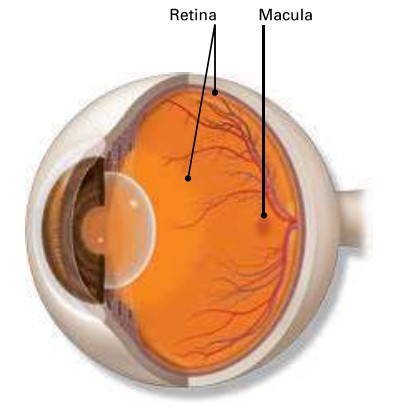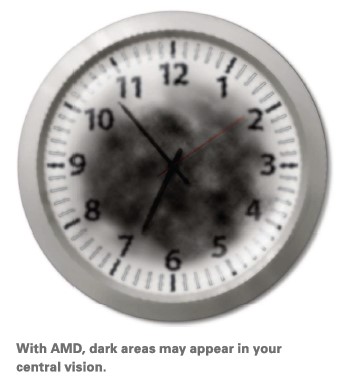AMD and Nutritional Supplements
People who have a certain form of age-related macular degeneration (AMD) may benefit from a specific mix of vitamins and minerals. Taking these nutritional supplements might help slow this eye disease.
What is AMD?
AMD is a leading cause of vision loss in people 50 years or older. It damages a specific part of your eye called the macula. With AMD, you lose the ability to see fine details, both close-up and at a distance.
AMD can affect one or both eyes. Your AMD may be so mild that you hardly notice any problems. Or your AMD may be more severe. With severe AMD, you may notice that printed words and even straight lines look wavy or blurry. You may also notice what seems to be a dark or empty space in the center of your vision. For example, you may see the outline of a clock but not see the hands to tell what time it is.
Although AMD affects your central vision, it does not affect your peripheral (side) vision, nor does it cause total blindness.
About 8 out of 10 people with AMD have the dry form. This condition is due to a breakdown or thinning of the macula. Dry AMD usually begins when tiny, yellow deposits called drusen form under the retina. Eventually, the macula may become thinner and stop working properly.
Many people with AMD have drusen. These alone do not cause vision loss. But when drusen grow in size or number, you are at risk for getting early or intermediate AMD. There are not always symptoms with these stages of AMD, though people with intermediate AMD might start to notice a blurred spot in their central vision.
Advanced AMD develops when cells in your macula begin to break down. This is when the blurred spot in your central vision starts getting bigger and darker. That is what robs you of your central vision.

Retina: Nerve layer at the back of your eye. It sends light signals to the brain so that you can see.
Macula: Small but important area in the center of the retina. You need the macula to see fine details of objects that are in front of you.
Drusen: Tiny white or yellow particles which form under the retina. They usually don’t cause vision loss. But many, or very large, drusen can be a sign of macular degeneration.
Dry AMD and nutritional supplements
AREDS 2 (Age-Related Eye Disease Study 2) was a very large research study. It looked at taking vitamins and minerals daily for AMD. This study found that certain nutritional supplements could help some people who have a lot of drusen. These supplements may also help people who have lost a lot of vision in at least one eye from AMD. Taking the following nutritional supplements every day may help these people lower their risk of getting late-stage or wet AMD:
- Vitamin C (500 mg)
- Vitamin E (400 IU)
- Lutein (10 mg)
- Zeaxanthin (2 mg)
- Zinc (80 mg)
- Copper (2 mg)
- Bilberry Fruit Extract
- Fish Oil
It is important to remember that nutritional supplements are not a cure for AMD, but they may help to slow the disease in some people with early- to mid-stage AMD.

Should you take nutritional supplements for AMD?
Talk with your ophthalmologist about whether nutritional supplements are recommended for you. Here are some topics to discuss:
- Your chance of getting advanced AMD. Studies show that nutritional supplements might help people with early to intermediate AMD who are at risk for developing advanced AMD.
- Eye-healthy foods. Studies show that nutritional supplements alone are not enough to prevent or delay advanced AMD. You also should eat a healthy, balanced diet. This includes dark leafy greens (like spinach and kale) along with yellow, orange and other colorful fruits and vegetables.
- Benefits and risks of nutritional supplements. Taking nutritional supplements can be helpful, but there can be possible health risks. Talk with your ophthalmologist and primary care doctor about how the vitamins and minerals listed above might affect you.
Summary
Some people with dry AMD might benefit from certain vitamins and minerals. Taking these nutritional supplements every day could help to slow their AMD.
You should talk with your ophthalmologist to learn if these nutritional supplements are recommended for you.
If you have any questions about your eyes or your vision, speak with your ophthalmologist. He or she is committed to protecting your sight.
Watch an AMD video from the American Academy of Ophthalmology’s EyeSmart program at aao.org/amd-link.
He or she is committed to protecting your sight.
Get more information about central serous chorioretinopathy from EyeSmart-provided by the American Academy of Ophthalmology-at aao.org/csr-link
